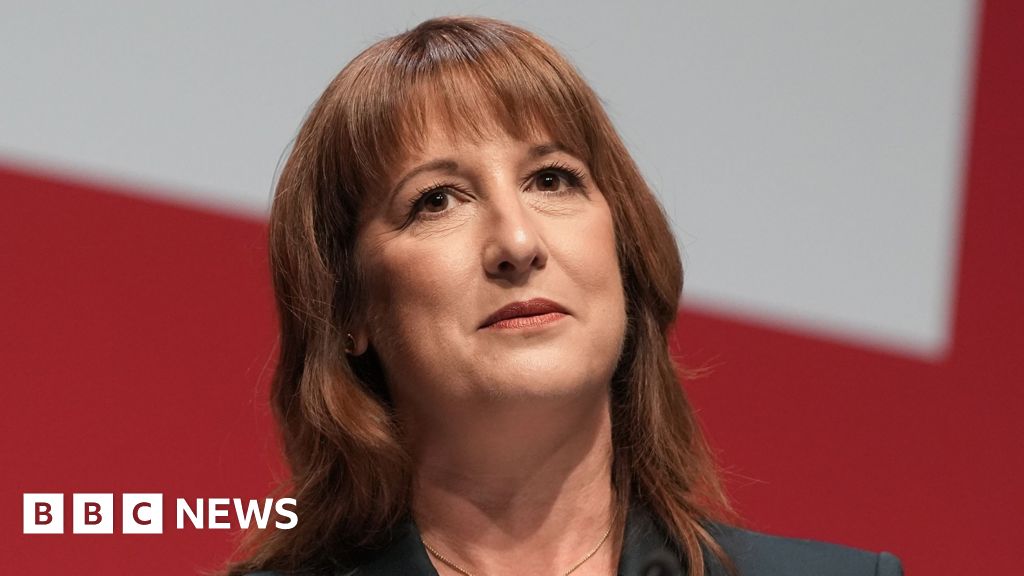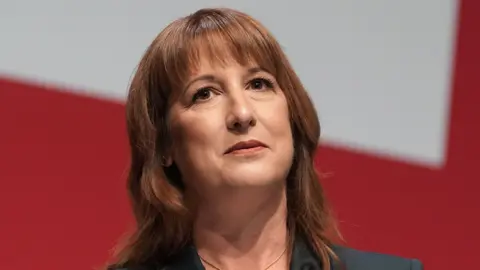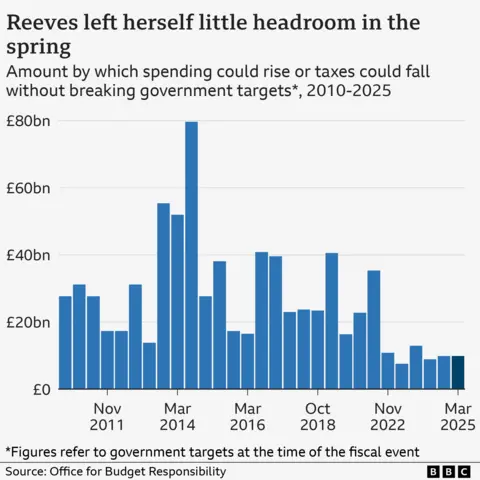Business
Reeves says Budget will be ‘fair’ as tax rises expected

Jennifer Meierhans,Business reporter and
Henry Zeffman,Chief political correspondent
 PA Media
PA MediaChancellor Rachel Reeves has said she will make “necessary choices” in the Budget after the “world has thrown more challenges our way”.
Her Downing Street speech did not rule out a U-turn on Labour’s general election manifesto pledge not to hike income tax, VAT or National Insurance.
When journalists explicitly asked if the government was set to break that pledge she did not answer directly but said she was “setting the context for the Budget”.
Ahead of the speech, shadow chancellor Sir Mel Stride dubbed it an “emergency press conference”, adding “higher taxes are on the way” and called for Reeves to be sacked if she “breaks her promises yet again”.
If there was any doubt about tax rises before this speech, there isn’t now.
Yet Reeves repeatedly refused to get into the specifics of which taxes might go up.
Instead she began the work of explaining why a year after delivering a tax-raising Budget and vowing not to come back for more, she is in fact coming back for more.
The chancellor said she would do what is necessary, not what is popular.
The reasons she gave were poor productivity, for which she blamed Conservative government policy including Brexit, austerity and short-sighted decisions to cut infrastructure spending, persistently high global inflation and the uncertainty unleashed by Donald Trump’s tariffs.
In short, Reeves’ argument is that the failings of others are being visited upon this government, and that it falls to her to confront decisions her predecessors ducked.
She pledged to come up with a “Budget for growth with fairness at its heart” aimed at bringing down NHS waiting lists, the national debt and the cost of living.
“It is important that people understand the circumstances we are facing, the principles guiding my choices – and why I believe they will be the right choices for the country,” she said.
There are some in government who want this to be a one-and-done Budget, in that they do not want to come back again and again every year, eking out a bit more money in tax to meet the requirements of the independent forecast.
That is seen as an argument for raising billions of pounds through increasing at least one of the income tax rates.
However, no chancellor has increased the basic rate in 50 years and it would be a big risk politically, especially with public trust in politics in general, and Prime Minister Sir Keir Starmer in particular, so low.
There is also the question of whether the prime minister and chancellor could land the argument that none of this was foreseeable before last year’s Budget.
The message from Reeves echoed comments made by Sir Keir to a group of Labour MPs on Monday night.
He told those gathered that the Budget would be “a Labour Budget built on Labour values” and that the government would “make the tough but fair decisions to renew our country and build it for the long term”.
It comes as the Resolution Foundation, which has close links to Labour and was previously run by Treasury minister Torsten Bell, said avoiding changes to VAT, NI or income tax “would do more harm than good”.
Hiking income tax would be the “best option” for raising cash, it said, but suggested it should be offset by a 2p cut to employee national insurance, which would “raise £6 billion overall while protecting most workers from this tax rise”.
Extending the freeze in personal tax thresholds for two more years beyond April 2028 would also raise £7.5 billion, its pre-Budget analysis suggested.
The government’s official forecaster, the Office for Budget Responsibility (OBR), is widely expected to downgrade its productivity forecasts for the UK at the end of the month. That could add as much as £20bn to the amount the chancellor will need to find if she is to meet her self-imposed “non-negotiable” rules for government finances.
The two main rules are:
- Not to borrow to fund day-to-day public spending by the end of this parliament
- To get government debt falling as a share of national income by the end of this parliament
The Treasury declined to comment on “speculation” ahead of the OBR’s final forecast, which will be published on 26 November alongside the Budget.
However, the chancellor confirmed last week that both tax rises and spending cuts are options as she aims to give herself “sufficient headroom” against future economic shocks.
Reeves said in her speech on Tuesday that her commitment to her fiscal rules was “iron-clad”.

The Resolution Foundation urged the chancellor to use the Budget to give herself more fiscal headroom, meaning how much leeway she has to increase spending or cut taxes without being forced to break her own rules.
After the last Budget, Reeves had £9.9bn of headroom – but the think tank said subsequent policy U-turns and changes in the economic outlook have turned that into a £4bn black hole.
The group said Reeves should double the level of headroom to £20bn in order to “send a clear message to markets that she is serious about fixing the public finances, which in turn should reduce medium-term borrowing costs and make future fiscal events less fraught”.
Last month, the Institute for Fiscal Studies (IFS) said there was a “strong case” to increase fiscal headroom.
The think tank said the lack of a bigger buffer created instability, and could leave the chancellor “limping from one forecast to the next”.
Business
Top stocks to buy today: Stock recommendations for February 4, 2026 – check list – The Times of India

Stock market recommendations: According to Mehul Kothari, DVP – Technical Research, Anand Rathi Shares and Stock Brokers, the top stocks to buy today (February 4, 2026) are Indian Oil Corporation, Tata Elxsi, and IFCI. Let’s take a look:IOC – Trendline Breakout with Indicator ConfirmationBuy: ₹165–₹163 | Stop Loss: ₹159 | Target: ₹172Indian Oil Corporation (IOC) has formed a strong base near its 100-DEMA, which has acted as a reliable dynamic support in recent sessions. The stock has also delivered a decisive trendline breakout, indicating a potential shift in short-term momentum.On the indicator front, a bullish MACD crossover is visible, signalling strengthening upside momentum. The Stochastic Oscillator has reversed higher near the 30 zone without entering deep oversold territory, suggesting improving price strength and underlying buying interest.The confluence of 100-DEMA support, trendline breakout, MACD bullish crossover and stochastic reversal points towards a constructive setup with scope for further upside if the breakout sustains.TATA ELXSI – Alligator Breakout with Bullish MomentumBuy: ₹5,500–₹5,400 | Stop Loss: ₹4,900 (closing basis) | Target: ₹6,275 & ₹6,550 (1–3 months)TATA ELXSI has closed decisively above the Williams Alligator indicator, confirming a fresh uptrend and improvement in overall price structure.Momentum indicators remain supportive, with DMI in bullish mode (+DI above −DI), indicating strengthening buying pressure and positive directional movement. Additionally, the MACD sustaining above the zero line reflects strong trend momentum and increases the probability of continued upside.This combination of Alligator breakout, bullish DMI structure and positive MACD trend suggests a trend-continuation setup with scope for further upside in the coming weeks.IFCI – Alligator Breakout & Retest ConfirmationBuy: ₹56–₹50 | Stop Loss: ₹46 (closing basis) | Target: ₹63.5 & ₹67 (1–3 months)IFCI has closed decisively above the Williams Alligator indicator and has successfully completed a retest of the breakout zone, confirming continuation of the emerging uptrend and strengthening bullish structure.The DMI has turned positive (+DI above −DI), indicating buyers are in control and directional momentum is favouring the upside. The MACD sustaining above the zero line further supports positive trend momentum and enhances the probability of further upside movement.The alignment of price breakout, retest confirmation and bullish indicators suggests a constructive medium-term setup with favourable risk-reward.(Disclaimer: Recommendations and views on the stock market, other asset classes or personal finance management tips given by experts are their own. These opinions do not represent the views of The Times of India)
Business
Younger and lower-paid workers hit hardest by rising labour costs, figures show

Younger and entry-level workers are being squeezed the hardest by higher employment costs slowing the rate that firms are hiring, new analysis shows.
Some UK businesses have seen the cost of employing workers rise on the back of recent policy measures, including tax and minimum wage increases and reforms to employment rights, the National Institute of Economic and Social Research (Niesr) said in its latest economic outlook.
These factors have raised the marginal cost of hiring by around 7%, in real terms, for an entry level position, according to its findings.
Niesr warned that sectors most exposed to cost increases were experiencing a bigger impact, pointing to data showing a link between exposure to the national minimum wage and rising unemployment.
This includes typically lower-paid industries such as hotels, hospitality and food chains, which also have a greater concentration of younger and early-career workers.
Its analysis found that, rather than cutting existing jobs, many firms have chosen to slow the rate that they hire staff.
Therefore younger workers and those “at the margins of the labour market” are being disproportionately squeezed, the think tank said.
Official figures at the end of last year showed that the unemployment rate rose to its highest level since early 2021 over the three months to September.
The Office for National Statistics (ONS) said that young people especially were struggling in the tougher hiring climate, with an 85,000 increase in those unemployed aged between 18 to 24 in the three months to October – the biggest jump since November 2022.
The number of young people not in employment, education or training – so-called Neets – has been rising since 2021, and hit the highest level since 2014.
In its report, Niesr said it was “hard to escape the conclusion that the rising cost of labour has deterred full-time job creation, particularly for younger workers”.
Lord Frost, director general of the Institute of Economic Affairs, said the findings “laid bare the costs of the Government’s national insurance and minimum wage hikes, and Employment Rights Act: a spike in the cost of hiring entry-level workers, meaning fewer jobs and opportunities for young people”.
Business
Chipotle stock sinks as restaurant chain reports falling traffic, weak guidance

A Chipotle store stands in the Bronx in New York City on April 23, 2025.
Spencer Platt | Getty Images
Chipotle Mexican Grill on Tuesday reported quarterly earnings and revenue that topped analysts’ expectations, although traffic to its restaurants fell for the fourth straight quarter.
For 2026, the company is projecting flat same-store sales growth, signaling that the burrito chain’s woes are not expected to disappear quickly. Chipotle ended a bumpy 2025 with a full-year same-store sales decline of 1.7%.
Shares of the company fell as much as 11% in extended trading.
Here’s what the company reported compared with what Wall Street was expecting, based on a survey of analysts by LSEG:
- Earnings per share: 25 cents adjusted vs. 24 cents expected
- Revenue: $2.98 billion vs. $2.96 billion expected
The fast-casual chain reported fourth-quarter net income of $330.9 million, or 25 cents per share, down from $331.8 million, or 24 cents per share, a year earlier.
Excluding impairment costs, gains from terminating restaurant leases and other items, Chipotle earned 25 cents per share.
Net sales rose 4.9% to $2.98 billion.
The company’s same-store sales fell 2.5% for the quarter, making this reporting period the third quarter of the year with same-store sales declines. However, Wall Street was anticipating a steeper same-store sales decrease of 3%, according to StreetAccount estimates.
Traffic to Chipotle restaurants fell by 3.2%. Executives have previously said they have seen a pullback in spending from consumers of all income cohorts, although low-income diners have made the most significant shift to their behavior.
Over the past year, shares of Chipotle have lost roughly a third of their value, dragging the company’s market value down to about $51 billion. Investor enthusiasm for the stock waned after the fast-casual chain began reporting shrinking traffic to its restaurants.
To bring back customers, Chipotle is focusing on improving the chain’s operations and adding new menu items, rather than leaning into discounts. In December, at the tail end of the quarter, the company unveiled “protein cups,” with the goal of convincing protein-obsessed customers to stop by for a snack, not just lunch or dinner.
Chipotle opened 132 company-owned locations and seven restaurants run by international licensees during the quarter. That brought its total to 334 company-owned locations and 11 international partner restaurants opened for the year.
In 2026, the company is projecting that it will open 350 to 370 new restaurants, including 10 to 15 international locations that will be run by licensees.
-

 Sports1 week ago
Sports1 week agoPSL 11: Local players’ category renewals unveiled ahead of auction
-

 Sports1 week ago
Sports1 week agoCollege football’s top 100 games of the 2025 season
-

 Entertainment1 week ago
Entertainment1 week agoClaire Danes reveals how she reacted to pregnancy at 44
-

 Business1 week ago
Business1 week agoBanking services disrupted as bank employees go on nationwide strike demanding five-day work week
-

 Politics1 week ago
Politics1 week agoTrump vows to ‘de-escalate’ after Minneapolis shootings
-

 Sports1 week ago
Sports1 week agoTammy Abraham joins Aston Villa 1 day after Besiktas transfer
-

 Entertainment1 week ago
Entertainment1 week agoK-Pop star Rosé to appear in special podcast before Grammy’s
-

 Tech1 week ago
Tech1 week agoBrighten Your Darkest Time (of Year) With This Smart Home Upgrade






